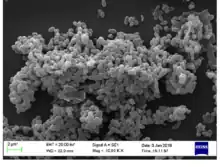Akkermansia muciniphila
Akkermansia muciniphila is a human intestinal symbiont, isolated from human feces.[2] It is a mucin-degrading bacterium belonging to the genus, Akkermansia, discovered in 2004 by Muriel Derrien and Willem de Vos at Wageningen University of the Netherlands.[3][2]: 1474 It belongs to the phylum Verrucomicrobiota and its type strain is MucT (=ATCC BAA-835T =CIP 107961T).[2] It is under preliminary research for its potential association with metabolic disorders.[4][5][6]
| Akkermansia muciniphila | |
|---|---|
 | |
| Scanning electronic micrograph of Akkermansia muciniphila.[1] | |
| Scientific classification | |
| Domain: | |
| Phylum: | |
| Class: | Verrucomicrobiae |
| Order: | Verrucomicrobiales |
| Family: | Akkermansiaceae |
| Genus: | |
| Species: | A. muciniphila |
| Binomial name | |
| Akkermansia muciniphila Derrien et al 2004 | |
Morphology
A. muciniphila is a gram-negative, strictly anaerobic, non-motile, non-spore-forming, oval-shaped bacterium.[7]
Ecology and metabolism
It colonizes the gastrointestinal tract of humans and other animals and can be found within the intestinal mucosal layer of the epithelial crypts as well as in the caecum.[7] It specifically resides at the oxic-anoxic interface.[8] A. muciniphila is found in about 90% of healthy humans, makes up about 1% to 3% of the fecal microbiota and colonizes the gut during the first year of life. Its prevalence can decrease with age or in disease states.[9]
A. muciniphila is able to use mucin as its sole source of carbon, nitrogen and energy, and is hence considered a specialist.[3] It degrades mucin to produce beneficial products such as short chain fatty acids which aid in growth of other bacteria and maintain healthy mucus turnover.[9] It also maintains microbial balance by competing with and inhibiting the over-growth of other mucin degrading bacteria. A. muciniphila is culturable under anaerobic conditions on medium containing porcine gastric mucin or synthetic medium containing protein source with glucose, N-acetylglucosamine and N-acetylgalactosamine.[2][10]
Genomics
The circular chromosome of the type strain contains 2,664,102 base pairs and its proteome contains 5644 unique proteins.[7]
A. muciniphila strain Urmite was sequenced in its entirety from a human feces sample.[11]
Human consumption
Oral Akkermansia muciniphila, either live or pasteurized, "are safe and well tolerated in overweight and obese individuals."[6] However, its safety for use as a treatment during disease states is unestablished.[6]
The European Union has recognized pasteurized Akkermansia muciniphila MucT as a novel food, provided the cells are killed beyond the limit of detection.[12]
References
- Zhang, Ting; Li, Qianqian; Cheng, Lei; Buch, Heena; Zhang, Faming (November 2019). "Akkermansia muciniphila is a promising probiotic". Microbial Biotechnology. 12 (6): 1109–1125. doi:10.1111/1751-7915.13410. ISSN 1751-7915. PMC 6801136. PMID 31006995.
- Derrien, M. (2004). "Akkermansia muciniphila gen. nov., sp. nov., a human intestinal mucin-degrading bacterium". International Journal of Systematic and Evolutionary Microbiology. 54 (5): 1469–1476. doi:10.1099/ijs.0.02873-0. PMID 15388697.
- de Vos, W.M. (2017). "Microbe Profile: Akkermansia muciniphila: a conserved intestinal symbiont that acts as the gatekeeper of our mucosa". Microbiology. 1635 (5): 646–648. doi:10.1099/mic.0.000444. PMID 28530168.
- Everard, Amandine; Belzer, Clara; Geurts, Lucie; et al. (28 May 2013). "Cross-talk between Akkermansia muciniphila and intestinal epithelium controls diet-induced obesity". Proceedings of the National Academy of Sciences of the United States of America. 110 (22): 9066–9071. Bibcode:2013PNAS..110.9066E. doi:10.1073/pnas.1219451110. PMC 3670398. PMID 23671105.
- Dao, Maria Carlota; Everard, Amandine; Aron-Wisnewsky, Judith; et al. (March 2016). "Akkermansia muciniphila and improved metabolic health during a dietary intervention in obesity: relationship with gut microbiome richness and ecology". Gut. 65 (3): 426–436. doi:10.1136/gutjnl-2014-308778. PMID 26100928.
- Luo, Yuheng; Lan, Cong; Li, Hua; et al. (2022-10-17). "Rational consideration of Akkermansia muciniphila targeting intestinal health: advantages and challenges". npj Biofilms and Microbiomes. 8 (1): 81. doi:10.1038/s41522-022-00338-4. ISSN 2055-5008. PMC 9576740. PMID 36253412.
- Aggarwal, Vidushi; Sunder, Sushant; Verma, Smita Rastogi (2022-12-01). "Disease-associated dysbiosis and potential therapeutic role of Akkermansia muciniphila, a mucus degrading bacteria of gut microbiome". Folia Microbiologica. 67 (6): 811–824. doi:10.1007/s12223-022-00973-6. ISSN 1874-9356. PMC 9122250. PMID 35596115.
- Ouwerkerk, Janneke P.; van der Ark, Kees C. H.; Davids, Mark; Claassens, Nico J.; Finestra, Teresa Robert; de Vos, Willem M.; Belzer, Clara; Schloss, P. D. (1 December 2016). "Adaptation of Akkermansia muciniphila to the Oxic-Anoxic Interface of the Mucus Layer". Applied and Environmental Microbiology. 82 (23): 6983–6993. doi:10.1128/AEM.01641-16. PMC 5103097. PMID 27663027.
- Iwaza, Rim; Wasfy, Reham Magdy; Dubourg, Grégory; Raoult, Didier; Lagier, Jean-Christophe (2022). "Akkermansia muciniphila: The state of the art, 18 years after its first discovery". Frontiers in Gastroenterology. 1. doi:10.3389/fgstr.2022.1024393. ISSN 2813-1169.
- van Passel, Mark W. J.; Kant, Ravi; Zoetendal, Erwin G.; Plugge, Caroline M.; Derrien, Muriel; Malfatti, Stephanie A.; Chain, Patrick S. G.; Woyke, Tanja; Palva, Airi; de Vos, Willem M.; Smidt, Hauke (3 March 2011). "The Genome of Akkermansia muciniphila, a Dedicated Intestinal Mucin Degrader, and Its Use in Exploring Intestinal Metagenomes". PLOS ONE. 6 (3): e16876. Bibcode:2011PLoSO...616876V. doi:10.1371/journal.pone.0016876. PMC 3048395. PMID 21390229.
- Caputo, Aurélia; Dubourg, Grégory; Croce, Olivier; Gupta, Sushim; Robert, Catherine; Papazian, Laurent; Rolain, Jean-Marc; Raoult, Didier (2015). "Whole-genome assembly of Akkermansia muciniphila sequenced directly from human stool". Biology Direct. 10 (1): 5. doi:10.1186/s13062-015-0041-1. PMC 4333879. PMID 25888298.
- Turck, Dominique; Bohn, Torsten; Castenmiller, Jacqueline; De Henauw, Stefaan; Hirsch‐Ernst, Karen Ildico; Maciuk, Alexandre; Mangelsdorf, Inge; McArdle, Harry J; Naska, Androniki; Pelaez, Carmen; Pentieva, Kristina; Siani, Alfonso; Thies, Frank; Tsabouri, Sophia; Vinceti, Marco; Cubadda, Francesco; Frenzel, Thomas; Heinonen, Marina; Marchelli, Rosangela; Neuhäuser‐Berthold, Monika; Poulsen, Morten; Prieto Maradona, Miguel; Schlatter, Josef Rudolf; van Loveren, Henk; Ackerl, Reinhard; Knutsen, Helle Katrine (September 2021). "Safety of pasteurised Akkermansia muciniphila as a novel food pursuant to Regulation (EU) 2015/2283". EFSA Journal. 19 (9). doi:10.2903/j.efsa.2021.6780. PMC 8409316. PMID 34484452.
Further reading
- Derrien, Muriel; Collado, M. Carmen; Ben-Amor, Kaouther; Salminen, Seppo; de Vos, Willem M. (2008). "The Mucin Degrader Akkermansia muciniphila Is an Abundant Resident of the Human Intestinal Tract". Applied and Environmental Microbiology. 74 (5): 1646–1648. Bibcode:2008ApEnM..74.1646D. doi:10.1128/AEM.01226-07. PMC 2258631. PMID 18083887.